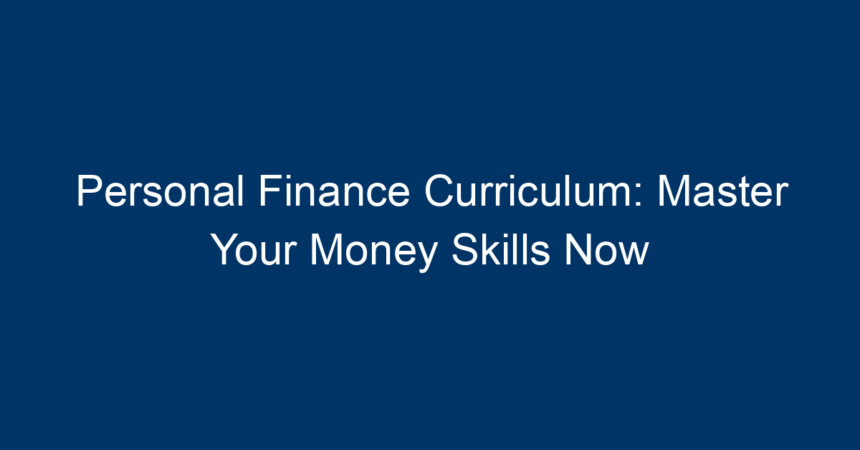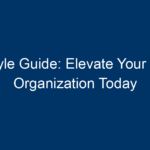In today’s fast-paced world, financial literacy is more crucial than ever. Whether you’re a college student, a young professional, or someone looking to improve your financial situation, a solid personal finance curriculum can provide the tools you need to manage your money effectively. This guide will delve into the importance of a personal finance curriculum, the skills it should encompass, and how you can implement these lessons into your life.
The Importance of Financial Literacy
Financial literacy refers to the ability to understand and apply various financial skills. This includes everything from budgeting, saving, investing, to understanding credit. The consequences of being financially illiterate can be detrimental, leading individuals into debt cycles, inability to save for emergencies, and poor investment choices.
A comprehensive personal finance curriculum can empower you to make informed decisions and build a stable financial future. According to recent studies, individuals with a strong financial education report higher levels of saving, less debt, and greater overall financial well-being.
Key Components of a Personal Finance Curriculum
To help you master your money skills, a well-rounded personal finance curriculum should cover the following essential areas:
1. Budgeting: Your Financial Blueprint
A budget serves as the foundation of any good financial strategy. Understanding your income and expenses will help you allocate resources effectively. Here are key elements to consider when creating a budget:
- Income Identification: Include all sources of income, from salaries to freelance work.
- Expense Tracking: Categorize your expenses into fixed (rent, utilities) and variable (groceries, entertainment) costs.
- Savings Goals: Allocate a portion of your income towards savings and investments.
Actionable Tip: Use budgeting apps to monitor your expenses regularly. Setting up notifications can also help you stay on track.
2. Saving & Emergency Funds: Financial Safety Nets
Having savings is critical for financial stability. The curriculum should emphasize the importance of:
- Emergency Fund: Aim to save at least three to six months’ worth of living expenses.
- High-Interest Savings Accounts: Look for accounts that offer competitive interest rates to grow your savings faster.
Actionable Tip: Set up automatic transfers from your checking account to your savings account to ensure you are consistently putting money aside.
3. Debt Management: Taming the Beast
Managing debt is a vital skill in any personal finance curriculum. Understanding different types of debt—such as credit cards, student loans, and mortgages—can help you make better repayment decisions.
- Debt Snowball vs. Debt Avalanche: Familiarize yourself with these two methods of paying down debt. The snowball method focuses on paying off the smallest debts first, while the avalanche method prioritizes debts with the highest interest rates.
Actionable Tip: Create a debt repayment plan and review it monthly to stay committed to your financial goals.
4. Understanding Credit: The Power of a Good Score
Your credit score can significantly impact your financial life. A good credit score can lead to lower interest rates on loans and better insurance premiums. Teaching the nuances of credit includes:
- Credit Reports: Learn how to read your credit report and check it regularly for errors.
- Building & Maintaining Credit: Explore ways to build credit responsibly through secured credit cards or loans.
Actionable Tip: Use credit responsibly and avoid maxing out credit cards to maintain a healthy credit utilization ratio.
5. Investing for the Future: Growing Your Wealth
Investing is essential for long-term wealth building. This section of a personal finance curriculum should cover:
- Investment Basics: Understand stocks, bonds, mutual funds, and real estate.
- Retirement Accounts: Familiarize yourself with 401(k)s, IRAs, and their tax advantages.
Actionable Tip: Start small. Consider robo-advisors or apps that allow for fractional investing to ease into the world of investments.
6. Taxes: The Unavoidable Topic
Taxes can be one of the most complex aspects of personal finance. A strong personal finance curriculum should educate you on:
- Understanding Tax Brackets: Learn how your income affects which tax bracket you fall into.
- Deductions: Familiarize yourself with common deductions to minimize taxable income.
Actionable Tip: Utilize tax preparation software or consult a tax professional to navigate your tax obligations every year.
7. Insurance: Protecting Your Assets
Understanding various types of insurance is crucial for holistic financial planning. This section should cover:
- Health Insurance: Importance of health coverage and understanding premiums, deductibles, and co-pays.
- Life and Property Insurance: The benefits of getting coverage for your home, car, and life.
Actionable Tip: Periodically review your insurance policies to ensure they match your current needs and circumstances.
8. Financial Goal Setting: Mapping Your Journey
Setting specific, measurable, achievable, relevant, and time-bound (SMART) financial goals is a fundamental part of self-directed financial education. This will help you stay committed and motivated.
- Short-term vs. Long-term Goals: Learn to differentiate between short-term objectives, like saving for a vacation, and long-term goals, like buying a house.
Actionable Tip: Write down your goals and review them monthly to track progress and make adjustments as needed.
Implementing Your Personal Finance Curriculum
Once you understand the critical components of a personal finance curriculum, the next step is implementation. Here are actionable insights to help you apply these skills:
-
Online Courses & Workshops: Invest time in reputable online courses that focus on personal finance. Many community colleges offer free workshops as well.
-
Books and Podcasts: Read books or listen to podcasts that focus on financial education. Authors like Dave Ramsey and Suze Orman offer various resources to build your knowledge.
-
Join Financial Communities: Engage with communities or forums focused on personal finance topics. Sharing knowledge and experiences can deepen your understanding and motivation.
- Regular Assessments: Regularly take time to assess your financial situation and adjust your strategies as necessary. Financial literacy is an ongoing learning process.
Conclusion: Take Control of Your Financial Future
Mastering your money skills through a comprehensive personal finance curriculum is not just beneficial, it’s essential. By understanding budgeting, saving, managing debt, building credit, investing, navigating taxes, securing insurance, and setting goals, you take significant steps towards a stable financial future.
Don’t wait for a financial crisis to start understanding your money; begin incorporating these lessons into your life today. Remember, financial freedom isn’t just a dream—it’s an achievable goal. Start your journey now, and watch as your confidence in managing your finances grows.
Invest in your financial education and build the foundation for a prosperous future!




